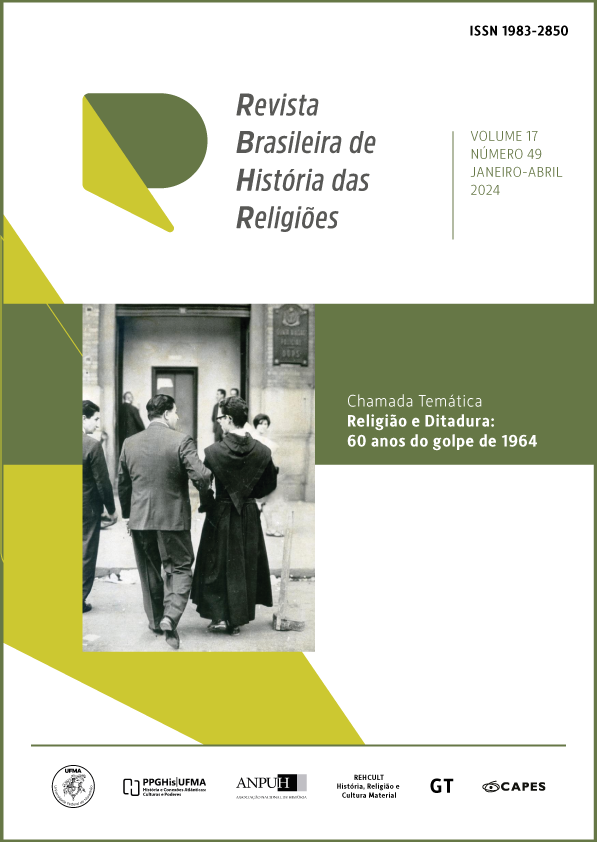“A Violência dos Pacíficos”
A Juventude Operária Católica Internacional contra a opressão no Brasil (1969)
DOI:
https://doi.org/10.18764/1983-2850v17n49.2024.3Palavras-chave:
Solidariedade Internacional, Direitos Humanos, Trabalhadores, Igreja CatólicaResumo
A perseguição a padres e a jovens trabalhadoras e trabalhadores católicos no Brasil foi o início das graves tensões abertas entre a cúpula militar e a cúpula eclesiástica organizada na Conferência Nacional de Bispos do Brasil (CNBB), logo após a implementação do Ato Institucional nº 5 de dezembro de 1968. Idealizada pelo jovem padre Joseph Cardijn, na Bélgica, a Juventude Operária Católica (JOC) foi reconhecida oficialmente em 1925 pela Santa Sé. No espaço de uma década, a JOC se espalhou pelo mundo e, em 1932, ela finalmente chegou ao Brasil. O golpe militar (1964) colocou em pauta novos desafios ao movimento operário e, consequentemente, à JOC, que passou a realizar uma reflexão mais profunda sobre as condições sócio-político-econômicas da classe trabalhadora naquele contexto latino-americano e brasileiro. Isto não passou despercebido pelos agentes do Estado autoritário, que começaram a acompanhar os militantes, sobre os quais caiu uma dura perseguição, culminando na prisão de muitas de suas lideranças. Foi nessa conjuntura que uma rede transnacional de solidariedade conduzida pela JOC Internacional expôs ao mundo, pelo menos ao Ocidente, o modus operandi do regime militar brasileiro que agredia frontalmente os Direitos Humanos. O artigo descreve as estratégias e experiências comuns vividas por uma organização sócio-política-religiosa numa cultura política marcada por um regime de força em que o elemento principal e aglutinador foi a solidariedade de caráter político e as formas de luta e agir político para além da ação coletiva.
Downloads
Metrics
Referências
Fonte documental
SIAN. Dossiê “Juventude Operária Católica (JOC) – DSI Vol. I”, nº BR DFANBSB Z4.DPN.ENI.134, 349 pp.
Livros e Artigos
ALVES, Márcio Moreira. A Igreja e a Política no Brasil. São Paulo: Brasiliense, 1979.
CAMARA, Dom Helder. Utopias peregrinas. Recife: Editora Universitária da UFPE, 1993.
CAMILO, Vandelir. O Relatório Secreto da Juventude Operária Católica. A rede entre bispos e leigos na Ditadura Militar brasileira Brasil-Bruxelas, 1970. In: Revista Latino-Americana de História, São Leopoldo: Programa de Pós-graduação em História da Universidade Vale do Rio dos Sinos (UNISINOS), vol. 8, nº. 21, pp. 242-258, jan/jul de 2019.
CLAUDINO, Assis. O monstro sagrado e o amarelinho comunista: Gilberto Freyre, Dom Helder e a revolução de 64. Recife: Opção, 1985.
CHALIAND, Gérad. Mythes Révolutionaires Du Tiers Monde. Paris: Éditions du Seuil, 1976.
KATHEN, Nelmo Roque Tem. Uma vida para os pobres: espiritualidade de D. Helder Camara. São Paulo: Loyola, 1991.
LE VEN, Michel Marie; AUGUSTO, Rosely Carlos (org.). Memórias vivas de 1968: a prisão dos padres franceses e do diácono brasileiro em Belo Horizonte. Belo Horizonte: Ed. PUC Minas, 2017.
MAINWARING. Scott. Igreja Católica e Política no Brasil (1916-1985). São Paulo: Brasiliense, 1989.
MURARO, Valmir Francisco. Juventude Operária Católica. São Paulo: Brasiliense, Col. Tudo é História, nº 97, 1985.
RIBEIRO, Maria Cláudia Badan. A Resistência à ditadura civil-militar brasileira e as Redes Transnacionais de Solidariedade (1964-1985). In: Anais do XXVIII Simpósio Nacional de História, Florianópolis: 2015, mimeo.
RAMPON, Ivanir Antônio. Paulo VI e Dom Helder Camara: exemplo de uma amizade espiritual. São Paulo: Paulinas, 2014.
ROCHA, Zildo. “Irmão dos pobres e meu irmão”: presença de Dom Helder em minha vida. Recife: Ed. do autor, 2019.
TARROW, Sidney. El poder en movimiento. Los movimientos sociales, la acción colectiva y la política, 2ª Edición, Madrid, Alianza, 2004.
Downloads
Publicado
Como Citar
Edição
Seção
Licença
Copyright (c) 2024 Revista Brasileira de História das Religiões

Esta obra está licenciado com uma Licença Creative Commons Attribution 3.0 Unported License.












